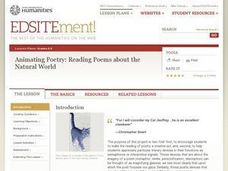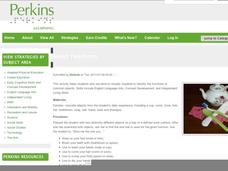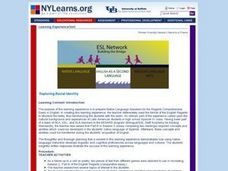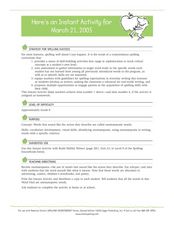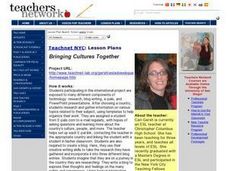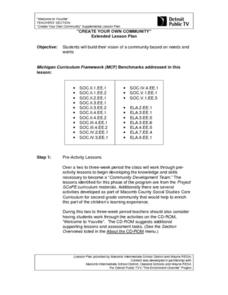Curated OER
Excellent Expression
Learners practice reading more fluently with expression and enthusiasm by reading aloud to help them realize how much more exciting and inviting stories can be when read with expression. They encounter the book, "Alexander and the...
Curated OER
You've Got to Express Yourself!
Students listen as a sample paragraph is read twice; first without expression, and the second time with lots of expression and discuss which they liked best. They brainstorm reasons why reading with expression is important listing them...
Curated OER
Here's and Instant Activity for October 20, 2008
Students complete spelling activities for words with or and ore spellings. In this spelling instructional activity, students find antonyms for the 'or' words in the first exercise. Students find synonyms for the second exercise.
National Endowment for the Humanities
Animating Poetry: Reading Poems about the Natural World
Students complete poetry analysis activities. In this poetry analysis instructional activity, students consider the use of imagery and sound devices in poetry. Students translate poetry into another art, read a diverse selection of...
Curated OER
Traveler's in Time
Students analyze artifacts to become familiar with the Great Migration. In this migration lesson, students read an article and answer comprehension questions. Students role play a migration scenario using an artifact to help describe...
Alabama Learning Exchange
Is it a Moth or a Butterfly?
Second graders examine the similarities and differences between moths and butterflies. They participate in a virtual field trip using a designated web site. They design a computer based slideshow using the information they find on the...
NASA
Let's Investigate Mars
Take your science class on a hypothetical field trip to Mars with an engaging astronomy lesson. After first learning about NASA's Mars rover missions, young scientists plan their own scientific investigations of Earth's nearest neighbor.
Curated OER
Moon Mining
Go on a moon mining expedition from the safety of your classroom with this space exploration simulation. Using simple models of the moon's surface prepared ahead of time by the teacher, young scientists are challenged with locating and...
Perkins School for the Blind
Object Functions
What does that thing do? For learners with low or no vision, understanding an object's function is a necessary skill. Here learners handle a number of objects and are asked to determine which object is for a specific task. They can feel...
Roy Rosenzweig Center for History and New Media
Immigration: Why Come to the United States?
Don't limit your curriculum to texts! Young historians listen to a song, read an interview, and examine a cartoon as they explore motivations for immigrating to the US in the late 19th and early 20th centuries.
Curated OER
The Water Cycle: A Repeating Pattern in Nature
Students are introduced to the terms related to the water cycle in their native language. In groups, they describe the steps of the cycle using different materials found in their art classroom. They describe how energy helps water...
Curated OER
Pronunciation: Practicing Stress and Intonation
Young scholars improved pronunciation by focusing on the stress-time nature of spoken English.
Curated OER
ESL Network: Exploring Racial Identity
Twelfth graders drill for the Regents Comprehensive Exam in English by answering questions about selected readings as preparation for writing essays. After answering the questions, they compose essays adhering to formal written Spanish...
Curated OER
Fun with Food: Hola Jalapeno
Students engage in an at-home lesson on language. It contains components that address Adult Education/ESOL, and age appropriate activities for Toddler, Preschool and School aged Students. Adults reinforce steps to prepare tacos in...
Curated OER
Minimal Pair Pronunciation Lesson
Learners distinguish minor differences between English vowel sounds.
Curated OER
National Sterotypes
Students develop their own ideas about the world around them. This lesson helps them improve their descriptive adjective vocabulary while they discuss perceived differences between nations through stereotypes.
Curated OER
Speaking Skills - Asking Questions
Students improve speaking confidence when using difficult question forms. This lesson focuses on helping students explain how to engage in this kind of social conversation. A worksheet imbedded in this plan provides practice.
Curated OER
Countable and Uncountable Nouns - Noun Quantifiers
Students solidify their knowledge of countable and uncountable nouns and their quantifiers. The lesson includes a number of overlooked or idiomatic expressions to help higher level students expand their knowledge.
Curated OER
Math Game Night
Students plan a family game night. In this problem solving instructional activity, students brainstorm games to play, watch a video to help with room arrangement and determine which room arrangement would work best. When all the...
Curated OER
Here's an Instant Activity: Onomatopeia Word-Search
Eighth graders complete a worksheet on onomatopoeia. In this spelling lesson, 8th graders review the concept of onomatopoeia. The attached worksheet for students includes a word-search of thirty onomatopeic words. Although the lesson is...
Curated OER
Bringing Cultures Together
Students research specific information for the United Nations and present them in a PowerPoint presentation. They connect with another student in in their country of research by emailing them. They create a blog of creative writing...
Curated OER
If You Give a Mouse a Cookie
Students read "If You Give a Mouse a Cookie" by Laura Joffee Numeroff with their teacher, discuss the concept of cause and effect, and create their own story boards for a class story.
Curated OER
If You Give a Mouse a Cookie
Students identify the cause and effect in the book If You Give a Mouse a Cookie. In this cause and effect lesson plan, students listen to the story If You Give a Mouse a Cookie and discuss what the cause and effect is. As a follow-up,...
Curated OER
"CREATE YOUR OWN COMMUNITY"
Second graders, after spending several weeks developing skills necessary to become a "Community Development Team," create and build their vision of a community. Consideration is given for needs and wants, food, shelter, safety concerns,...





